- Home
- Paulo Coelho
Brida Page 12
Brida Read online
Page 12
She needed to go there and thank him for all he had taught her.
Whenever she went in search of that man, she was looking for something; whenever she found that something, all she did was leave, often without even saying good-bye. But he had shown her the door through which she hoped to pass at the next Equinox. She should at least say “thank you.”
No, she wasn’t afraid of falling in love with him. She had read things in Lorens’s eyes about the hidden side of her own soul, and while she might have her doubts about being able to dream of a dress, as regards his love, about that she was perfectly clear.
Thank you for accepting my invitation,” she said to the Magus when they sat down. They were sitting in the only pub in the village, which is where she had first noticed the strange light in his eyes.
The Magus said nothing. He noticed that her energy was quite different now; she had clearly managed to awaken the Force.
“On the night you left me alone in the forest, I promised that I’d come back either to thank you or to curse you. I promised that I’d come back when I found my path. But I didn’t keep either of those promises. I always came in search of help, and you never let me down. It may be presumptuous of me, but I want you to know that you have acted as God’s instrument, and I would like you to be my guest tonight.”
Just as she was about to order two whiskies, he got up, went over to the bar, and returned carrying two bottles, one of wine and one of mineral water, and two glasses.
“In Ancient Persia,” he said, “when two people met to drink together, one of them was chosen to be King of the Night, usually the person who was paying.”
He didn’t know if his voice sounded sufficiently steady. He was a man in love, and Brida’s energy had changed.
He placed the wine and the mineral water before her.
“It was up to the King of the Night to set the tone of the conversation. If he poured more water than wine into the first glass to be drunk, that meant he wished to speak of serious things. If he poured equal quantities of both, they would speak of both serious and pleasant things. Finally, if he filled the glass with wine and added only a few drops of water, the night would be relaxing and enjoyable.”
Brida filled the glasses to the brim with wine and added only a drop of water to each.
“I came to say thank you,” she said again, “for teaching me that life is an act of faith, and that I am worthy of the search. That has helped me enormously on the path I’ve chosen.”
They both drained that first glass quickly. He because he was feeling tense. She because she was feeling relaxed.
“Only light subjects, all right?” Brida said.
The Magus said that since she was the King of the Night, it was up to her to decide what they should talk about.
“I want to know a little about your personal life. I want to know if you ever had an affair with Wicca.”
He nodded. Brida felt an inexplicable tremor of jealousy, but she wasn’t sure whether she felt jealous of him or of Wicca.
“But we never considered living together,” he said. They both knew the two Traditions. They both knew that they were not each other’s Soul Mate.
“I didn’t want to learn how to see the point of light,” thought Brida, but she saw now that this was inevitable. That was what love between witches was like.
She drank a little more. She was getting closer to her objective; it would not be long now until the Spring Equinox, and she could afford to relax. It had been a long time since she had allowed herself to drink more than she should, but now, all she had to do was dream of a dress.
They continued talking and drinking. Brida wanted to return to the subject of Wicca, but she needed him to be more relaxed, too. She kept both their glasses filled, and they finished the first bottle while in the middle of a conversation about the difficulties of living in such a small village. The locals associated the Magus with the Devil.
Brida was pleased to feel important to him; he must be very lonely. Maybe no one in the village ever addressed more than a few polite words to him. They opened another bottle, and she was surprised to see that a Magus, a man who spent all day in the forest seeking communion with God, was also capable of drinking and getting drunk.
By the time they had finished the second bottle, she had forgotten that she was there in order to thank the man sitting opposite her. Her relationship with him—she realized now—had always been a veiled challenge. She didn’t want to see him as an ordinary person, but she was getting dangerously close to doing just that. She preferred the image of the wise man who had led her to a cabin high up in the trees and who often spent hours contemplating the sunset.
She began to talk about Wicca, to see how he reacted. She said what an excellent Teacher she was and how she had taught her everything she needed to know so far, but in such a subtle way that it was as if she’d always known the things she was learning.
“But you have,” said the Magus. “That is the Tradition of the Sun.”
“He’s obviously not going to admit that Wicca is a good teacher,” thought Brida. She drank another glass of wine and continued to talk about her Teacher, but the Magus made no further comment.
“Tell me about you and her,” she said, to see if she could provoke him. She didn’t want to know, she really didn’t, but it was the best way to get a reaction.
“A case of young love. We were part of a generation that knew no limits, the generation of the Beatles and the Rolling Stones.”
She was surprised to hear this. Far from relaxing her, the wine was making her tense. She still wanted to ask those questions, but now she realized that she wasn’t happy with the answers.
“That was when we met,” he went on, unaware of her feelings. “We were both seeking our respective paths, and they crossed when we happened to go to the same Teacher. Together we learned about the Tradition of the Sun and the Tradition of the Moon, and both, in our own fashion, became Teachers.”
Brida decided to pursue the subject. Two bottles of wine can make complete strangers feel as if they have been friends from childhood; wine gives people courage.
“Why did you split up?”
It was the Magus’s turn to order another bottle. She noticed this and grew even more tense. She would hate to find out that he was still in love with Wicca.
“We split up when we learned about Soul Mates.”
“If you hadn’t found out about those points of light or the special light in your Soul Mate’s eyes, would you still be together?”
“I don’t know. I only know that if we were, it wouldn’t work for either of us. We only understand life and the Universe when we find our Soul Mate.”
Brida paused for a moment, suddenly lost for words. It was the Magus who took up the conversation.
“Let’s go,” he said, after taking only a sip of the wine from that third bottle. “I need to feel the wind and the cold air on my face.”
“He’s getting drunk,” she thought. “And he’s afraid.” She felt proud of herself; she could take her drink better than he could, and she wasn’t in the least afraid of losing control. She had come out that night intending to enjoy herself.
“Just a little more. After all, I’m the King of the Night.”
The Magus drank another glass, but he knew he had reached his limit.
“You haven’t asked me anything about myself,” she said challengingly. “Aren’t you curious? Or can you use your powers to see right through me?”
For a fraction of a second, she felt she had gone too far, but then she dismissed the thought. She merely noticed a change in the Magus’s eyes; there was a completely different light in them now. Something in Brida seemed to open, or, rather, she had the sense of a wall coming down, a feeling that, from then on, everything would be permitted. She remembered the last time they had been together, her desire to stay with him, and his coldness. Now she understood that she hadn’t gone there that night in order to thank him, but to seek revenge: to tel
l him that she’d discovered the Force with another man, a man she loved.
“Why do I need revenge? Why am I angry with him?” she wondered, but the wine wouldn’t allow her to answer those questions coherently.
The Magus was looking at the young woman opposite him, and the desire to demonstrate his Power kept coming and going in his mind. On a night very like this, many years ago, his whole life had changed. It might have been the age of the Beatles and the Rolling Stones, but there were also people around at the time in search of unknown forces, forces they didn’t even believe in. They made use of magical powers while still thinking that they were stronger than the powers themselves, convinced that they’d be able to leave the Tradition as soon as boredom set in. He had been one of those people. He had entered the sacred world through the Tradition of the Moon, learning rituals and crossing the bridge that connects the visible and the invisible.
At first, he dabbled in these powers on his own, learning from books, with no help from anyone. Then he met his Teacher. At their first meeting, his Teacher told him that he would be better off learning through the Tradition of the Sun, but the Magus didn’t want that. The Tradition of the Moon was more interesting; it involved performing ancient rituals and learning the wisdom of time. And so his Teacher taught him the Tradition of the Moon, saying that perhaps this was the path that would eventually lead him to the Tradition of the Sun.
At the time, he was utterly sure of himself, of life, and of his conquests. A brilliant career lay ahead of him, and he intended using the Tradition of the Moon to achieve his goals. In order to do so, witchcraft demanded that he first become a Teacher, and that he never infringe the one limitation placed on all Teachers of the Tradition of the Moon: never to interfere with another person’s free will. He could forge his own path in the world by using his magical knowledge, but he couldn’t get rid of someone simply because they were in his way nor could he force them to follow him on his path. That was the one prohibition, the only tree of whose fruit he must not eat.
And everything went smoothly until he fell in love with one of his Teacher’s other students, and she fell in love with him. Both knew the Traditions; he knew that he was not her man, and she knew that she was not his woman. Nevertheless, they surrendered to their love, leaving life in charge of separating them when the time came. Far from diminishing their passion, this only made them live each moment as if it were their last, and the love between them had all the intensity of things that take on an eternal quality precisely because they’re going to die.
Then one day, she met another man. This man knew nothing of the Traditions, nor did he have a point of light above his left shoulder or the special light in his eyes that reveals someone to be your Soul Mate. Love, however, is no respecter of reasons, and she fell in love; as far as she was concerned, her time with the Magus had come to an end.
They quarreled and fought; he begged and implored. He subjected himself to all the usual humiliations endured by people in love. He learned things he never dreamed he would learn: hope, fear, acceptance. “He doesn’t have the point of light above his left shoulder,” he argued, “you told me that yourself.” But she didn’t care. Before she did finally meet her Soul Mate, she wanted to know other men, to experience the world.
The Magus set a limit on his pain. When he reached it, he would forget all about her. For a reason he could now no longer remember, he did reach that limit, but instead of forgetting her, he discovered that his Teacher was right—emotions were like wild horses and it required wisdom to be able to control them. His passion was stronger than all his years of studying the Tradition of the Moon, stronger than all the mind-control techniques he had learned, stronger than the rigid discipline to which he’d had to submit in order to get where he was. Passion was a blind force, and it kept whispering in his ear that he must not lose that woman.
He could do nothing against her; she was a Teacher, like him, and she had learned her trade over many incarnations, some filled with fame and glory, others marked by fire and suffering. She would know how to defend herself.
However, there was a third party involved in this furious struggle. A man caught in destiny’s mysterious web, a web that neither Magi nor Witches can understand. An ordinary man, perhaps as in love with that woman as he was, a man who wanted her to be happy and to do his best for her. An ordinary man, whom Providence’s mysterious designs had thrown into the middle of this battle between a man and a woman who knew the Tradition of the Moon.
One night, when he could stand the pain no longer, he ate of the forbidden fruit. Using the power and knowledge that the wisdom of Time had taught him, he removed that man from the woman he loved.
He did not know to this day whether or not she ever found out, but it may well be that she had already grown tired of her new conquest and didn’t much mind his leaving. However, his Teacher knew. His Teacher always knew everything, and the Tradition of the Moon was implacable with those Initiates who used Black Magic, especially to influence that most important and most vulnerable of human emotions: Love.
When he confronted his Teacher, he understood that the sacred vow he had made was impossible to break. He understood that the forces he thought he could control and use were far more powerful than he was. He understood that he was on his chosen path, but that it was not a path like any other. And he understood that in this incarnation he could never leave that path.
Now that he had erred, he had to pay a price, and the price was to drink that cruellest of poisons—loneliness—until Love felt that he had once more been transformed into a Teacher. Then, the same Love that he had wounded would set him free again and finally reveal his Soul Mate to him.
You haven’t asked me anything about myself. Aren’t you curious? Or can you use your powers to see right through me?”
His past took no more than a second to flash through his mind, just long enough for him to decide whether to allow things to happen as they would in the Tradition of the Sun or to speak to her about the point of light and thus interfere in fate.
Brida wanted to be a witch, but she hadn’t yet achieved that ambition. He remembered the cabin high up in the tree, when he had come very close to telling her; now he was tempted again, because, having lowered his guard, he had forgotten that the Devil is in the detail. We are all masters of our own destiny. We can so easily make the same mistakes over and over. We can so easily flee from everything that we desire and which life so generously places before us.
Alternatively, we can surrender ourselves to Divine Providence, take God’s hand, and fight for our dreams, believing that they always arrive at the right moment.
“Let’s go,” said the Magus. And Brida could see that this time he was serious.
She made a point of paying the bill; after all, she was the King of the Night. They put on their coats and went out into the cold, which was now less bitter—in a matter of weeks, it would be spring.
They walked together to the bus station. A bus was due to leave in a few minutes. Out in the cold, Brida’s feelings of irritation were replaced by a terrible confusion, which she could not explain. She didn’t want to get on that bus; everything was wrong; it seemed to her that she’d entirely failed to achieve her main objective of the evening and that she needed to put everything right before she left. She had come there to thank him, and yet she was behaving just as she had on the previous two occasions.
She didn’t get on the bus, saying that she felt sick.
Fifteen minutes passed, and another bus arrived.
“I don’t want to leave,” she said, “not because I drank too much and feel ill, but because I’ve spoiled everything. I haven’t thanked you as I should have.”
“This is the last bus,” said the Magus.
“I’ll get a taxi later, even if it’s expensive.”
When the bus left, Brida regretted not having got on it. She was confused. She had no idea what she wanted. “I’m drunk,” she thought, and said:
“Let�
��s go for a walk. I need to sober up.”
They strolled through the empty village, with the streetlamps lit and all the windows dark. “It’s just not possible. I saw the light in Lorens’s eyes and yet I want to stay here with this man.” She was just an ordinary, fickle woman, unworthy of all that she had learned and experienced through witchcraft. She was ashamed of herself: all it took was a few glasses of wine, and Lorens—her Soul Mate—and everything she’d learned in the Tradition of the Moon were suddenly of no importance. She wondered briefly if she’d been wrong, perhaps the light in Lorens’s eyes wasn’t the light spoken of in the Tradition of the Sun. But, no, she was merely fooling herself; no one can fail to recognize the light in the eyes of their Soul Mate.
If she were to meet Lorens in a crowded theater, without ever having spoken to him before, the moment their eyes met, she would know for sure that he was the man for her. She would find a way of approaching him, and he would welcome her approaches, because the Traditions are never wrong: Soul Mates always find each other in the end. Long before she knew anything about Soul Mates, she had often heard people speak about that inexplicable phenomenon: Love at First Sight.
Any human being could recognize that light, without any need for magical powers. She had known about it before she knew of its existence. She had seen it, for example, in the Magus’s eyes, the first time they went to the pub together.
She stopped.
“I’m drunk,” she thought again. She must simply forget all about it. She needed to count her money to see if she had enough for a taxi fare back. That was important.
But she had seen the light in the Magus’s eyes, the light that showed he was her Soul Mate.
“You’re very pale,” said the Magus. “You must have drunk too much.”
“It will pass. Let’s sit down for a while until it does. Then I’ll go home.”
They sat on a bench while she fumbled around in her bag in search of money. She could stand up, find a taxi, and leave forever; she had a Teacher and she knew how to continue her path. She knew her Soul Mate, too; if she decided to get up now and leave, she would still be fulfilling the mission God had set her.

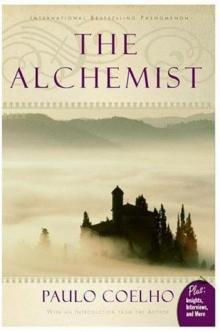 The Alchemist
The Alchemist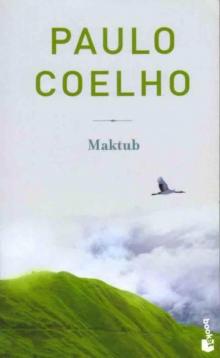 Maktub
Maktub Like the Flowing River
Like the Flowing River The Winner Stands Alone
The Winner Stands Alone The Spy
The Spy By the River Piedra I Sat Down and Wept: A Novel of Forgiveness
By the River Piedra I Sat Down and Wept: A Novel of Forgiveness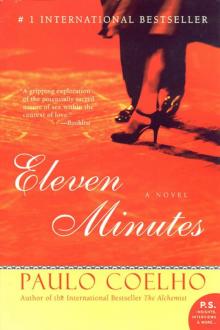 Eleven Minutes
Eleven Minutes Manuscript Found in Accra
Manuscript Found in Accra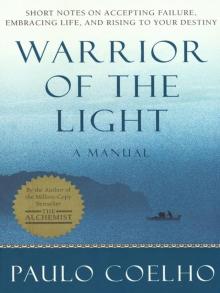 Warrior of the Light
Warrior of the Light Veronika Decides to Die: A Novel of Redemption
Veronika Decides to Die: A Novel of Redemption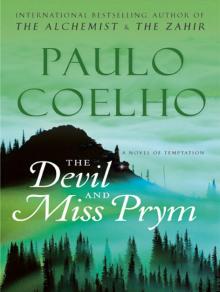 The Devil and Miss Prym: A Novel of Temptation
The Devil and Miss Prym: A Novel of Temptation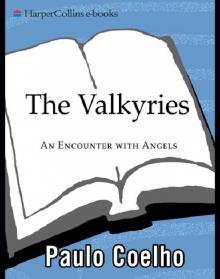 The Valkyries: An Encounter With Angels
The Valkyries: An Encounter With Angels Brida: A Novel
Brida: A Novel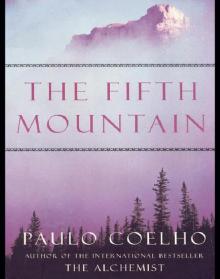 Fifth Mountain: A Novel
Fifth Mountain: A Novel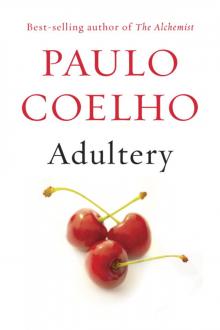 Adultery
Adultery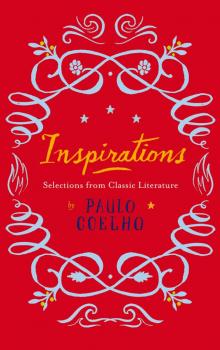 Inspirations
Inspirations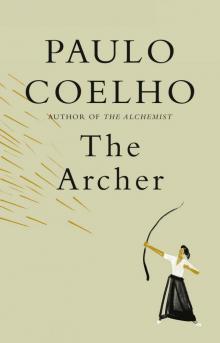 The Archer
The Archer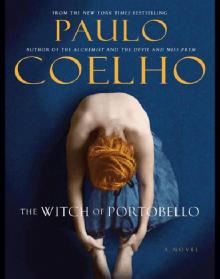 The Witch of Portobello
The Witch of Portobello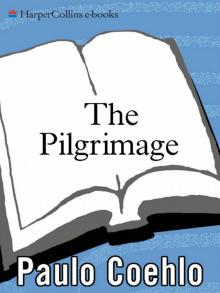 The Pilgrimage
The Pilgrimage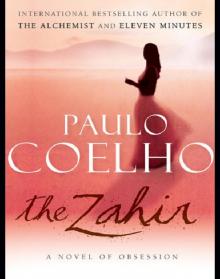 The Zahir
The Zahir Brida
Brida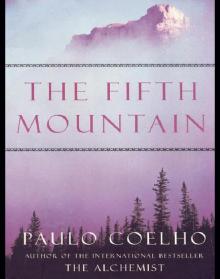 The Fifth Mountain
The Fifth Mountain Like the Flowing River: Thoughts and Reflections
Like the Flowing River: Thoughts and Reflections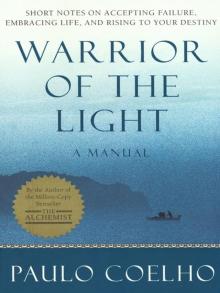 Manual of the Warrior of Light
Manual of the Warrior of Light By The River Piedra I Sat Down & Wept
By The River Piedra I Sat Down & Wept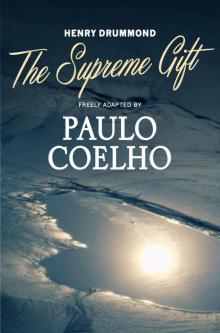 The Supreme Gift
The Supreme Gift Aleph
Aleph Hippie
Hippie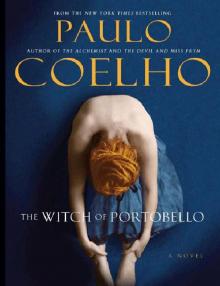 Witch of Portobello
Witch of Portobello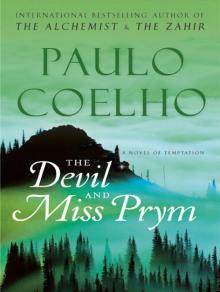 The Devil and Miss Prym
The Devil and Miss Prym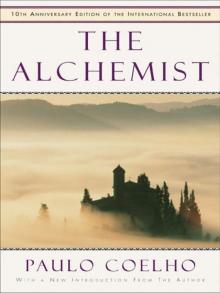 The Alchemist - 10th Anniversary Edition
The Alchemist - 10th Anniversary Edition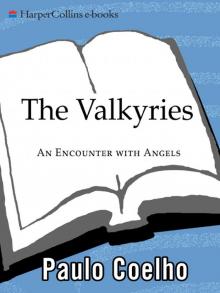 The Valkyries
The Valkyries